小学英语-现在完成时资料
小学英语动词现在完成时
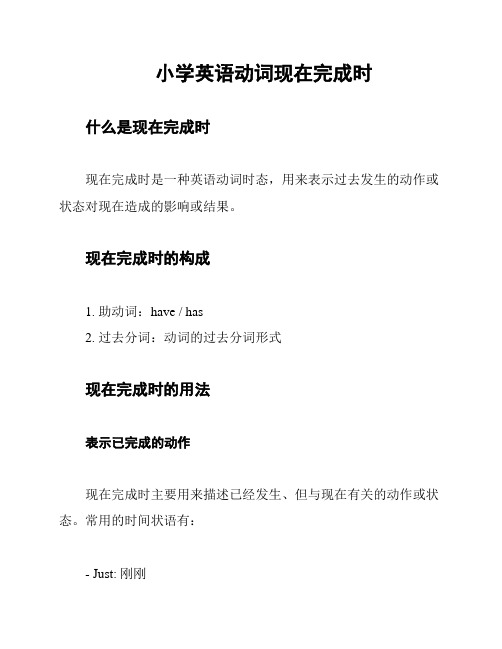
小学英语动词现在完成时什么是现在完成时现在完成时是一种英语动词时态,用来表示过去发生的动作或状态对现在造成的影响或结果。
现在完成时的构成1. 助动词:have / has2. 过去分词:动词的过去分词形式现在完成时的用法表示已完成的动作现在完成时主要用来描述已经发生、但与现在有关的动作或状态。
常用的时间状语有:- Just: 刚刚- Yet: 还- Already: 已经- Ever: 曾经- Never: 从未- So far: 到目前为止- Recently: 最近- Lately: 最近例如:- I have just finished my homework.(我刚刚完成了作业。
)- Have you eaten breakfast yet?(你吃早饭了吗?)- They have already left for the airport.(他们已经去机场了。
)表示持续到现在的动作或状态现在完成时还可以用来表达一个动作或状态从过去开始一直延续到现在,强调对现在的影响或结果。
例如:- I have lived in this city for five years.(我已经在这个城市住了五年了。
)- We have known each other for a long time.(我们认识彼此已经很久了。
)注意事项1. 现在完成时与过去时态的区别在于现在完成时强调对现在的影响或结果,而过去时态则只描述过去的动作或状态。
2. 动词的过去分词形式可以通过动词原形加上-ed(大多数情况下)或者根据不规则动词的变化形式来构成过去分词。
希望以上内容对你理解小学英语动词现在完成时有所帮助。
现在完成时
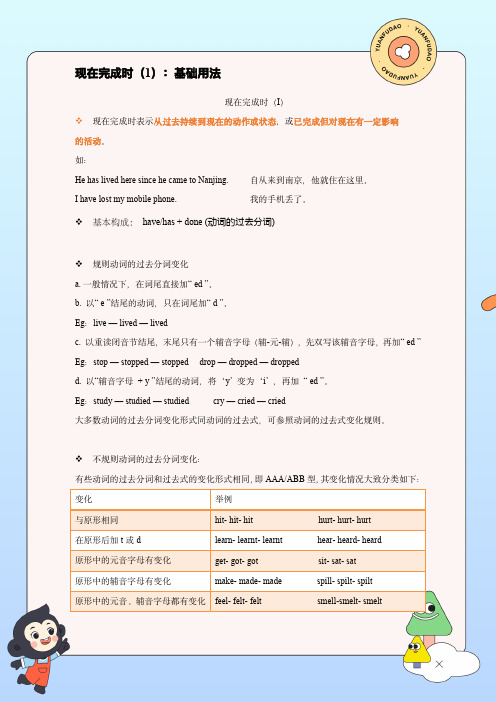
现在完成时(1):基础用法现在完成时(I)现在完成时表示从过去持续到现在的动作或状态,或已完成但对现在有一定影响的活动。
如:He has lived here since he came to Nanjing.自从来到南京,他就住在这里。
I have lost my mobile phone.我的手机丢了。
基本构成:have/has+done(动词的过去分词)规则动词的过去分词变化a.一般情况下,在词尾直接加“ed”。
b.以“e”结尾的动词,只在词尾加“d”。
Eg:live—lived—livedc.以重读闭音节结尾,末尾只有一个辅音字母(辅-元-辅),先双写该辅音字母,再加“ed”Eg:stop—stopped—stopped drop—dropped—droppedd.以“辅音字母+y”结尾的动词,将‘y’变为‘i’,再加“ed”。
Eg:study—studied—studied cry—cried—cried大多数动词的过去分词变化形式同动词的过去式,可参照动词的过去式变化规则。
不规则动词的过去分词变化:有些动词的过去分词和过去式的变化形式相同,即AAA/ABB型,其变化情况大致分类如下:变化举例与原形相同hit-hit-hit hurt-hurt-hurt在原形后加t或d learn-learnt-learnt hear-heard-heard原形中的元音字母有变化get-got-got sit-sat-sat原形中的辅音字母有变化make-made-made spill-spilt-spilt原形中的元音、辅音字母都有变化feel-felt-felt smell-smelt-smelt有些动词的过去分词和过去式的变化不同,即ABA/ABC型,其变化大致分类如下:变化举例与原形相同come-came-come run-ran-run原形中的元音字母有变化ring-rang-rung sing-sang-sung在原形上加en eat-ate-eaten fall-fell-fallen在原形上加n see-saw-seen give-gave-given在过去式上加n steal-stole-stolen break-broke-broken 原形、过去式和过去分词差异较大do-did-done go-went-gone现在完成时(2):时间状语常与现在完成时连用的时间状语:1.already,yet,still,never,ever,just,before...2.for+一段时间,since+时间点3.recently,lately,so far...4.in the past two years...例句:He has already taken first prize twice.他已经拿过两次一等奖了。
现在完成时语法解释大全
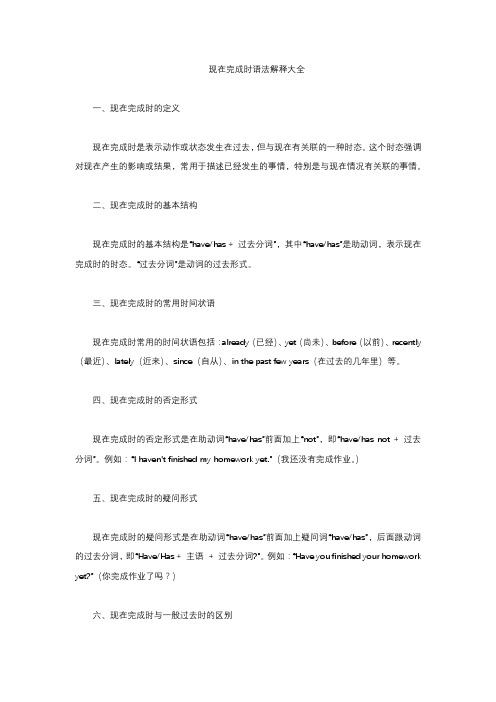
现在完成时语法解释大全一、现在完成时的定义现在完成时是表示动作或状态发生在过去,但与现在有关联的一种时态。
这个时态强调对现在产生的影响或结果,常用于描述已经发生的事情,特别是与现在情况有关联的事情。
二、现在完成时的基本结构现在完成时的基本结构是“have/has + 过去分词”,其中“have/has”是助动词,表示现在完成时的时态。
“过去分词”是动词的过去形式。
三、现在完成时的常用时间状语现在完成时常用的时间状语包括:already(已经)、yet(尚未)、before(以前)、recently (最近)、lately(近来)、since(自从)、in the past few years(在过去的几年里)等。
四、现在完成时的否定形式现在完成时的否定形式是在助动词“have/has”前面加上“not”,即“have/has not + 过去分词”。
例如:“I haven't finished my homework yet.”(我还没有完成作业。
)五、现在完成时的疑问形式现在完成时的疑问形式是在助动词“ha ve/has”前面加上疑问词“have/has”,后面跟动词的过去分词,即“Have/Has + 主语+ 过去分词?”。
例如:“Have you finished your homework yet?”(你完成作业了吗?)六、现在完成时与一般过去时的区别现在完成时与一般过去时都表示过去发生的动作或状态,但它们的重点不同。
现在完成时强调对现在的影响或结果,而一般过去时只是简单地描述过去发生的事情,不涉及现在的状态。
例如:“I finished my homework an hour ago.”(我一小时前完成了作业。
)(用一般过去时)和“I have finished my homework now.”(我已经完成了作业。
)用现在完成时则强调现在不需要做作业了,对现在的情况产生了影响。
现在完成时

现在完成时(1)常考用法:①表示过去发生或已经完成的动作,并对现在造成一定影响或结果。
already(已经),never(从不),ever(曾经),yet(还), just(刚刚),before(在…之前).till now(迄今), two/three times(两/三次),since then(从那时以来), for(达/计),so far(到目前为止), in the past/last….years(在过去几年),for+一段时间for 2days/1month/3years/an hour等,since+时间点(1)already(已经)通常用于肯定句中△already①可放在助动词与过去分词之间②也可放在句末! I've read this book already. I've already read this book.我已经读过这本书了(2)yet在疑问句中意为"已经”,在否定句中意为"还”Nina hasn't found her bag yet.△yet常放在句末!妮娜还没有找到她的包。
(3)ever(曾经)常用于疑问句或否定句中ever放在助动词与过去分词之间!Have you ever been to Beijing?你曾去过北京吗?(4)never(从来没有)表示否定,常与before连用△before要放在句尾!△never多放在助动词与过去分词之间!I have never been to Beijing before. 我以前从来没有去过北京。
持续性→表示过去已经开始,持续到现在的动作或状态,并有可能继续进行下去。
☆与段时间连用谓语动词必须是延续性动词注意: ☆常与for+一段时间since+过去的点时间或从句(从句用一般过去时)so far(到目前为止)等时间状语连用☆对for和since引导的时间状语提问要用how long(1) I have lived here since 2020. △延续性动词自从2020年以来我就住在这里。
英语语法-现在完成时
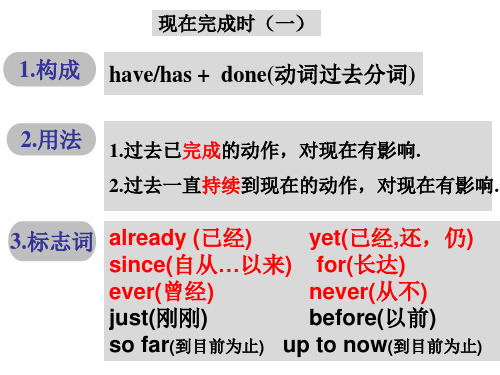
—No, he _h_a_s_g_o_n_e_t_o_ the school library. He left five minutes ago.
Exercise
做过,泛泛而谈,标志词,用现在完成时 做过,有明确的过去时间,用一般过去时
It is + 时间段 since +一般过去时的句子.
1. 他的爷爷已经去世2年了。 It is 2 years since his grandpa died.
2. Nick 参军3年了. It is 3 years since Nick joined the army.
3. 他离开深圳好长时间了。 It is a long time since he left Shenzhen. 4. 这本书我已借了4个月了. It is 4 months since I borrowed the book .
3) I’ve just finished Oliver Twist. 我刚看完《雾都孤儿》这本书。
现在完成时构成 have/ has + done (过去分词)
原形-过去式ed-过去分词ed pick → picked → picked wish → wished → wished
like → liked → liked phone→ phoned → phoned
She hasn’t told us the news yet. 3. The rain has already stopped. (改一般疑问句)
Has the rain stopped yet? 4. I have waited here for two hours. (划线提问)
小学英语五年级语法讲解:现在完成时
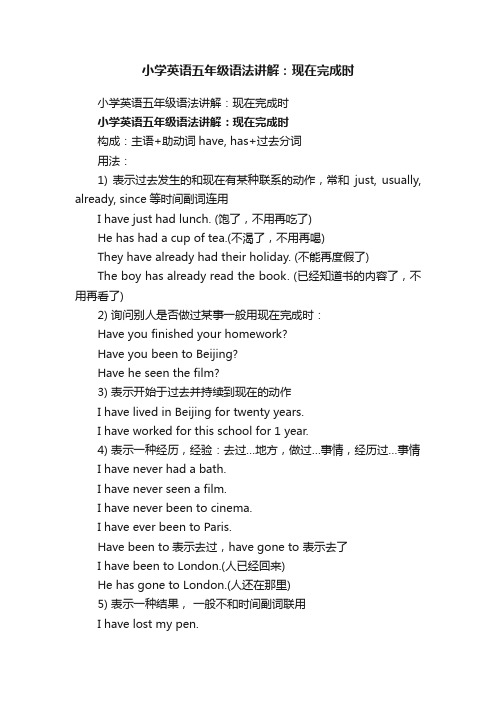
小学英语五年级语法讲解:现在完成时小学英语五年级语法讲解:现在完成时小学英语五年级语法讲解:现在完成时构成:主语+助动词have, has+过去分词用法:1) 表示过去发生的和现在有某种联系的动作,常和just, usually, already, since等时间副词连用I have just had lunch. (饱了,不用再吃了)He has had a cup of tea.(不渴了,不用再喝)They have already had their holiday. (不能再度假了)The boy has already read the book. (已经知道书的内容了,不用再看了)2) 询问别人是否做过某事一般用现在完成时:Have you finished your homework?Have you been to Beijing?Have he seen the film?3) 表示开始于过去并持续到现在的动作I have lived in Beijing for twenty years.I have worked for this school for 1 year.4) 表示一种经历,经验:去过…地方,做过…事情,经历过…事情I have never had a bath.I have never seen a film.I have never been to cinema.I have ever been to Paris.Have been to表示去过,have gone to 表示去了I have been to London.(人已经回来)He has gone to London.(人还在那里)5) 表示一种结果,一般不和时间副词联用I have lost my pen.I have hurt myself.He has become a teacher.She has broken my heart.句型变化:变疑问句将助动词移到句首,变否定句在助动词后面加not.e.g. Have you lost your pen? I have not lost my pen.肯定回答及否定回答Yes, I have. No, I have not.特殊疑问句:What have you done?What has he done?一般过去时与现在完成时的区别:凡是有明确的表示过去的时间状语的句子为过去时注意:有些动词表示的动作有一个终点,不能再延续,因此不能和表示一段时间状语连用错:I’ve left Beijing for 3 days.对:I left Beijing 3 days ago. I have been away from Beijing for 3 days.。
现在完成时知识点总结
现在完成时知识点总结现在完成时是英语中表示过去发生的动作对现在造成影响的一种时态。
下面是现在完成时的一些重点知识点总结:1. 构成方式:现在完成时由“have/has + 过去分词”构成。
其中,have用于第一人称和第二人称,has用于第三人称单数。
2. 表示时间:现在完成时经常与表示过去的时间状语连用,如already(已经)、just(刚刚)、yet(还)、ever(曾经)、never(从未)、before(以前)等。
此外,它还可以与一些表过去体验和经历的副词连用,如recently(最近)、lately(最近)、so far(到目前为止)等。
3. 用法:(1)表示过去发生的动作对现在造成的影响或结果。
例句:I have finished my homework.(我已经完成了作业。
)例句:She has lost her key.(她丢了钥匙。
)(2)表示在过去某个不确定的时间内发生的动作或经历。
例句:I have been to Paris.(我曾去过巴黎。
)例句:Have you ever tried sushi?(你曾经尝试过寿司吗?)(3)表示刚刚完成的动作。
例句:The train has just arrived.(火车刚刚到了。
)例句:He has recently graduated from university.(他最近刚从大学毕业。
)4. 注意事项:(1)现在完成时一般与与过去发生的动作或经历有关的时间状语连用。
如表示对过去的操作有明确的时间状语,则应使用一般过去时态,而不是现在完成时态。
例句:I went to New York three years ago.(三年前我去过纽约。
)(2)注意have/has与过去分词的搭配规则,以及特殊的过去分词形式。
以上是对现在完成时的知识点总结,请在研究和运用过程中多加练,以熟练掌握该时态的用法和构成方式。
参考资料:。
现在完成时-经典教学教辅文档
如今完成时( 一)如今完成时表示过去发生的动作对如今酿成的影响或结果,也能够表示从过去某一工夫开始,不断持续到如今的动作或形状。
常与already“曾经”,just“刚刚”,ever“曾经”,never“从不”,before“之前”,yet“仍然”等连用。
1.如今完成时的结构:2.already与yet在如今完成时中的用法:already adv.曾经;早已通常用于肯定句中,普通用于have/has后,实义动词前,也可放在句尾。
例如:I have already had breakfast.我曾经吃过早饭了。
yet adv.还;曾经用于否定句和疑问句中,普通用在句末。
例如:I haven’t done my homework yet.我还没有造作业。
3.普经过去时与如今完成时的区别:( 1 )普经过去时表示过去某时发生的动作或单纯叙说过去的事情;如今完成时强调过去的动作对如今酿成的影响或结果。
例如:I saw this film yesterday.我昨天看了这部电影。
I have seen this film.这部电影我曾经看过了。
( 2 ) 普经过去经常与具体的表示过去的工夫状语( 如yesterday,last week,three days ago,in 1990等 )连用;如今完成时不与表示明确的过去的工夫状语连用,但可以与in the past...years/weeks,so far等工夫状语连用。
例如:Tom wrote a letter to his parents last night.昨晚汤姆给他父母写了一封信。
The weather has been so hot so far this summer.到目前为止,今年夏每天气不断很热。
Ⅰ.根据句意用所给词的适当方式填空1.I have already had ( have )lunch.I had( have ) it at 11:30.2.—Have you written ( write ) to your parents yet?—Yes,I wrote ( write ) to them last night. 3.—How clean the classroom is!—Yes,I’m sure that someone has cleaned ( clean ) it.4.Jerry started ( start ) to write the letter yesterday,but he hasn’t finished( not finish ) it yet.5.Mr.Brown has taught ( teach ) Amy French for a mon th,but she still can’t speak French well.Ⅱ.单项填空( B )1.—I heard you lost your book.youit?—Not yet.A.Did;findB.Have;foundC.Do;findD.Have;find( A )2.She has decided what to buy for her best friend.A.alreadyB.yetC.stillD.neither( B )3.—How do you like Treasure Island,Lucy?—It’s so exciting that I it twice already.A.am readingB.have readC.was readingD.had read( C )4.—Where are the flowers?—You see,someone them to the windows.A.movesB.will moveC.has movedD.would move( D )5.—The storybook is very interesting.—I agree with you.I it many times already.A.readB.will readC.am readingD.have read( C )6.—Has she finished her homework yet?—.She finished it ten minutes ago.A.No,she hasB.Yes,she doesC.Yes,she hasD.No,she hasn’t( A )7.I the book Little Women yet,but I’ll let you read it first.A.haven’t readB.don’t readC.won’t readD.didn’t read( B )8.Paula was pleased that she her lost watch yesterday.A.findsB.foundC.has foundD.will find( D)9.I can’t find my wallet anywhere.I’m sure Iit.A.lostB.will loseC.loseD.have lost( D )10.William Shakespeare for over 400 years,but his works still have great influence today.A.diedB.was dyingC.has diedD.has been dead。
英语语法-现在完成时讲解
第六讲现在完成时1. 概念:1)、表示动作或状态在过去已经开始, 持续到现在, 也许还要持续下去, 常和for, since, 连用, 表示持续的动作或状态多为延续性动词.eg: We have lived here since 2000.自从2000年以来我们一直住在这里. (说明一直住在这里, 也许还会住下去. )She has worked in Nanning for five years.She has been ill for a week.2)表示过去发生的或已经完成的某一动作对现在造成的影响或结果.eg: I have lost my pen. 我把钢笔弄丢了. (过去某时丢的, 现在还没有找到)I have already watched the TV play. 我已经看过这部电视剧了.--- Have you had your lunch yet ? 你吃过午饭了吗?--- Yes, I have just had it. 是的, 我刚吃过. (说明现在饱了)2. 结构:主语+ have / has + done + …3. 句型:⑴ 肯定句:① 主语+ have / has + done +…eg:She has been to Shanghai. 她去过上海.I have finished doing my homework. 我已经完成我的作业了.⑵否定句:①主语+ have / has + not +done + …eg:I haven ' t seen this film我没有看过这部电影.eg: She hasn ' t finished doing his homework她还没有完成她的作业.⑶一般疑问句:① Have / Has + 主语+ done + …eg:Have you seen this film ? Yes, I have. / No, I haven 't . 你看过这部电影吗? 是的, 看过. / 不, 没有.eg:Has she finished doing his homework ? Yes, she has . / No, she hasn 't. 她完成她的作业了吗? 是的, 完成了. / 不, 没有.⑷特殊疑问句:①特殊疑问词+ have / has + 主语+ done + …eg: When has you seen this film ? 你什么时候看的这部电影?eg: Who has finished doing his homework ? 谁完成了作业?4. 时间状语:典型的表时间的词与现在完成时连用,这些词有:for 、since、already 、yet、ever、never、recently、just、before、so far、by now、等连用. 注意:for+ 一段时间since+过去的某一个时间点I have lived in Nanning for ten years.I have lived in Nanning since ten years ago/ 2002.I haven ' t eaten anything for ten hours.I ha haven ' t eaten anything since 6am.already : 用于肯定句, 可放在助动词之后、过去分词之前,也可放在句末I have already finished my homework.yet: 用在疑问句中意为”已经” ,用在否定句中表示”还” ,常放在句末.Have you finished your homework yet?I haven ' t finished my homework yet.ever: 曾经用于疑问句中:Have you ever been to Beijing?Have you ever been to Shanghai ? 你去过上海吗? never: 未曾从未I have never traveled by plane before. 我以前从来没有乘飞机旅行过recently:最近用于肯定否定疑问句中I have been busy recently.We have not seen Tom recently.Have they been here recently.eg: I have just seen Tom.I haven ' t heard of it befo哦以前从来没有听说过这件事They have planted 2000 trees so far.The child has learned 100 English words by now.5. 当与一段时间连用时, 经常用for 加一段时间, 这时候谓语动词一定要用延续性的非延续性动词延续性动词改错:They have got married for ten years. I have borrowed this book for a week.get married--- be married borrow --- keepcome --- be here go --- be away / off buy --- havestart / begin --- be on leave --- be away die --- be deadarrive---be in/at join---be in /be a member of stop---be overreturn -- be back open/close---be closed/openeg: He came here three days ago. 他三天前来的这. (一般过去时)He has been here for three days. 他来这已经三天了.(现在完成时与一段时间连用, 非延续性动词变延续性动词. )He went to Dalian last week. 他上周去的大连. (一般过去时)He has been away for a week. 他已经离开有一周了. (现在完成时)I bought the book last month. 我去年买的这本书. (一般过去时)I have had the book for a month. 我保管这本书有一周了. (现在完成时)The football match started an hour ago.The football match has been on for an hour.6. 词义辨析have been to 曾经去过某地,说话时已经从某地回来或者已从该地去了其他的地方。
(完整版)小学现在完成时详细讲解与练习
(完整版)小学现在完成时详细讲解与练习什么是现在完成时?现在完成时是英语中的一种时态,用来描述过去发生的动作或事件对现在造成的影响或结果。
在现在完成时中,动词需要用到助动词“have/has”加上过去分词形式。
如何构成现在完成时的肯定句?现在完成时的肯定句构成为:“主语 + have/has + 过去分词 + 其他补充信息”。
例如:- I have finished my homework.(我已经完成了我的作业。
)- He has seen that movie.(他已经看过那部电影。
)如何构成现在完成时的否定句?现在完成时的否定句构成为:“主语 + have/has + not + 过去分词 + 其他补充信息”。
例如:- I have not finished my homework.(我还没有完成我的作业。
)- She has not seen that movie.(她还没有看过那部电影。
)如何构成现在完成时的疑问句?现在完成时的疑问句构成为:“Have/Has + 主语 + 过去分词 +其他补充信息?”例如:- Have you finished your homework?(你完成作业了吗?)- Has she seen that movie?(她看过那部电影吗?)现在完成时的用法现在完成时通常用来表示以下几种情况:1. 过去发生的动作对现在造成的影响或结果。
2. 过去开始的动作直到现在还在持续进行。
3. 刚刚完成的动作或经历。
例如:- I have lost my wallet.(我丢了钱包。
)- They have lived in this city for ten years.(他们在这个城市已经住了十年。
)- She has just arrived at the airport.(她刚刚到达机场。
)现在完成时的练1. 请用现在完成时造句:(例句仅供参考)- 我已经吃过晚饭了。
- 1、下载文档前请自行甄别文档内容的完整性,平台不提供额外的编辑、内容补充、找答案等附加服务。
- 2、"仅部分预览"的文档,不可在线预览部分如存在完整性等问题,可反馈申请退款(可完整预览的文档不适用该条件!)。
- 3、如文档侵犯您的权益,请联系客服反馈,我们会尽快为您处理(人工客服工作时间:9:00-18:30)。
小学英语-现在完成时新概念英语语法串讲——现在完成时现在完成时指的是过去发生并且已经完成的动作对现在造成影响或后果,过去某一时间开始并一直持续到现在并且有可能还会持续的动作或状态。
一、现在完成时的用法1. 过去某时发生的动作到目前为止这个动作已经完成。
如:1)I have finished my homework. 我做完家庭作业了。
(过去某时开始做,到现在已完成)2)He has already come 他已经来了。
(过去某时开始离开某地到这来,现在已在这。
)2. 表示动作发生在过去并延续到现在,有可能继续延续下去。
如:1)I have studied English for six years. 我已经学了六年英语了。
(六年前开始学英语,一直学到现在, 也可能继续学也可能就此不学了。
)2)I have lived in Shenyang since 1990. 我从1990年就在沈阳住。
(从1990年开始住在沈阳一直住到现在,也可能继续住也可能就此为止。
)二、现在完成时的结构1)肯定式:主语 + have / has + 过去分词2)否定式: 主语 + have / has + not + 过去分词3)一般疑问式 Have / Has + 主语 + 过去分词4)特殊疑问式特殊疑问词+have/has+主语+过去分词三、现在完成时的时间状语现在完成时常用的时间状语包括“already, yet,ever, etc”。
例如:We have learned about 3000 English words by the end of this term.到上学期末我们已经学了3000个英语单词。
注意:1) 当表示一段时间,现在完成时可以用for 或since引导的状语。
例如:I’ve known Li Li for 4 years. 我认识丽丽已经4年了。
I have worked here since 8 years ago. 自从8年前我就在这工作。
2) 当在肯定陈述句中含有already或just 时,在转换成否定句时,要把句中的already 或just 去掉,在句末加上yet.。
例如:I have already seen the film. ------ I haven’t seen the film yet.He has just come. ------He hasn’t come yet.注意:for和since的用法。
①for+时段为…时间②since+过去一个时间点(译为:自从……以来)③since+时段+ago④since+从句(过去时)⑤It is+时段+since+从句(过去时)四、过去分词变化规则如下:1 、规则动词:规则动词的过去分词的构成规则与规则动词的过去式的构成规则相同。
四点变化规则:(1)一般动词,在词尾直接加“ ed ”。
work---worked---worked ,visit---visited---visited(2)以“ e ”结尾的动词,只在词尾加“ d ”。
live---lived---lived ,(3)以“辅音字母+ y ”结尾的动词,将 "y" 变为 "i" ,再加“ ed ”。
study---studied---studied ,cry---cried---cried(4)重读闭音节结尾,末尾只有一个辅音字母,先双写该辅音字母,再加“ ed ”。
stop---stopped---stopped , drop---dropped--dropped2 、不规则动词变化需参看不规则动词表逐一熟记。
例如; cut- cut- cut,hit-- hit-- hit.五、使用时注意事项1.“have/ has got ” 形式上是一种完成时,但和have/ has 为同一意思“有”。
例如:Have you got pen-friends? Yes, I have.你有笔友吗?是的,我有。
Has he got a lot of work to do? No, he hasn’t.他有许多工作要做吗?不,他没有。
2. have/has gone to 、have/has been to 和have/has been in的区别。
have/ has gone to 去了,在去某地的路上或在某地,人还未回来have/ has been to 曾经去过,人已经回来了have/ has been in 已经在,常与一段时间连用He has been to Shenyang before. 他以前曾去过沈阳。
He has been in Shenyang for ten years. 他在沈阳10年了。
Has he gone to Shenyang? 他去沈阳了吗?3. have/ has been to常和once, twice, never, ever连用;have/ has gone to则不可。
例如:─ Has Tom ever been to Paris? 汤姆去过巴黎吗?─Yes, he’s been there many times. 是的,他去过好几次了。
─ Where have they gone? 他们去哪里了?─They’ve gone to Shenyang. 他们去沈阳了。
4.非延续性动词(或称作终止性动词)不能用“现在完成时 + 表示一段时间的状语”的句型中。
这类动词有:come, go, start, leave, die, buy, finish, join, borrow, stop等。
但它们能够用表示持续状态的相应的延续性动词替换句中的终止性动词。
arrive, come → be here, be in buy → havebegin, start → be on die → be deadget up → be up leave, move → be away;go out → be out borrow→keepfinish/end →be over open →be openclose →be closed join— be a member of六、现在完成时往往同表示不确定的过去时间状语连用,如already(肯定), yet(否定,疑问),just, before, recently,still, lately,never等.例如: He has already finished the work..典型例题1:His father_____the party since 1978A.joindB.has joinedC.was inD.has been in解析:本题考查学生对现在完成时的熟练掌握。
since 1978表达“自从1978年一直到现在”,表示这件事情从过去一直持续到现在,应该用现在完成时,而且动词必须是延续性动词,AB均为瞬间动词,不能与时间段连用,故排除;C为一般过去时,也不行。
答案;D.要牢记:一般过去时通常与表示过去的时间状语连用。
如:yesterday, last week , two years ago ,just now ,in 2002 等;而现在完成时则常与just ,already ,ever ,never 等副词和these days ,this week ,since ......, for ...... 等表示一段时间的状语连用。
现在完成时强调过去发生的动作对现在的影响和结果,而一般过去时与现在没有联系,只是说明某个动作发生的时间是在过去。
典型例题2:—______ you ___ your homework yet ?—Yes . I _____ it a moment ago .A.Did ; do ; finishedB.Have ; done ; finishedC.Have ; done ; have finished解析:本题考查一般过去时和现在完成时的用法区别。
问句中的yet表明应该用现在完成时,而回答中的a moment ago 是一个表示过去的时间状语,应该用一般过去时。
答案: B附表:动词——过去式——过去分词1、AAA型(原形、过去式和过去分词同形):2、cost cost cost cut cut cut let let letput put put read read read2、ABB型(过去式与过去分词同形):bring brought brought build built builtbuy bought bought catch caught caughtdig dug dug feel felt feltfind found found get got gothave had had hear heard heardhold held held keep kept kept※learn learnt learnt leave left leftlend lent lent make made mademeet met met pay paid paidsay said said sell sold soldsend sent sent shine shone shonesit sat sat sleep slept slept※smell smelt smelt spend spent spentstand stood stood teach taught taughttell told told think thought thought understand understood understood3、ABC型(原形、过去式和过去分词各异):be was/were been begin began begun blow blew blown break broke broken do did done draw drew drawn drink drank drunk drive drove driven eat ate eaten fall fell fallenfly flew flown forget forgot forgotten give gave given go went gone grow grew grown know knew known lie lay lain ride rode riddenring rang rung see saw seenshow showed shown sing sang sung speak spoke spoken swim swam swum take took taken throw threw thrown wake woke woken wear wore worn write wrote written4、ABA型(原形与过去分词同形):become became become come came come 5、AAB型(原形与过去式同形):beat beat beaten现在完成时练习一、选择填空1. Kate’s never seen Chinese films,____ ?A. hasn’t sheB. has sheC. isn’t sheD. is she2. -Mum, may I go out and play basketball?-______you______ your homework yet?A. Do;finishB. Are;finishingC. Did;finishD. Have;finished3. His brother has been to Stone Forest twice______he came to Yunnan.A. afterB. beforeC. sinceD. for4. Tom______the CD player for two weeks.A. has lentB. has borrowedC. has boughtD. has had5. I______a letter from him since he left.A. didn’t receiveB. haven’t gotC. didn’t haveD. haven’t heard6. -Have you ever______Beijing ? -Yes, I have.A. went toB. gone toC. been inD. been to7. My parents ______ Shandong for ten years.A. have been inB. have been toC. have gone toD. have been8. I won’t go to the concert because I ____my ticket.A. lostB. don’t loseC. have lostD. is coming9. – Where is Mr Liu? - He________ the library.A. has been toB. has gone toC. has been inD.has went10. We came to Shanghai three years ago, so we_______here for two years.A. have been toB. have been inC. have beenD. have gone11.- How long_______you _______your exam paper? - About three months.A. did;buyB. have;getC. have;hadD. have;bought12. He tells me he ________China for over eight years.A. has beenB. has been inC. has been toD. has gone to13. His parents________ for more than 3 years.A. have come hereB. have started to workC. have lived thereD. have left the university14.I_______ a letter from him since he left.A.didn't receive B.haven't got C.didn't have D.haven't heard 15.—Where have you _______ these days?—I have _______to Dalian with my friends.A.been;gone B.been;been C.gone;been D.gone;gone16.How long have you _______ this book?A.bought B.borrowed C.had D.lent17.—Where's Peter?—He _______ to Nanjing.A.is going B.has been C.has gone D.went18.We have lived here _______ five years ago.A.when B.since C.before D.after19.—I have watched the game.—When _______you _______ it?A.have;watched B.do;watch C.did;watch D.will;watch20. Miss Brown _______ to the Great Wall twice.A.have been B.has been C.have gone D.has gone二.用动词的适当形式填空1. I___________ already _________(see) the film. I_____________(see) it last week.2. —___________he___________(finish) his work yet? — Not yet.3. — ___________you___________(be) to Hong Kong?— Yes, I____________(be) there twice.4. — ___________you ever____________(eat ) chocolate? — No, never.5.My father____________ just___________(come) back from work. He is tired now.6. — Where's Li Ming? — He___________(go) to the teacher's office.7.I____________(work) here since I___________(move) here in 1999.8. — How long__________ the Wangs ____________(stay) here ? — For two weeks.三. 句型转换 (每空一词)1. I have been to Macau before. (改为否定句)I______ ______been to Macau before.2. He hasn't come to school because he's ill. (就划线部分提问)_________ _________ he come to school?3. He has learned English for 5 years. (就划线部分提问)__________ __________ ___________ __________learned English?4. I bought a new bike just now. (用just改写)I_______ just __________a new bike.5. We began to learn English three years ago. (改为同义句)We___________ ___________English _____________three years.四.填入has / have been 或has / have gone.1. Harry: I saw you in Annabel's Restaurant last night.Diana: No, it wasn't me. I ____________ never__________ there.2. Sam: Sally and Tim are on holiday, aren't they? Where________they __________?Sue:To Florida, again.Sam: How many times________they___________there?Sue: This is their third visit.3. Steve: Can I speak to Jill, please?Lynn: She's out, I'm afraid. She____________to the cinema this evening.Steve: Again? She________already__________to the cinema three times this week.五、用for 或since填空。
